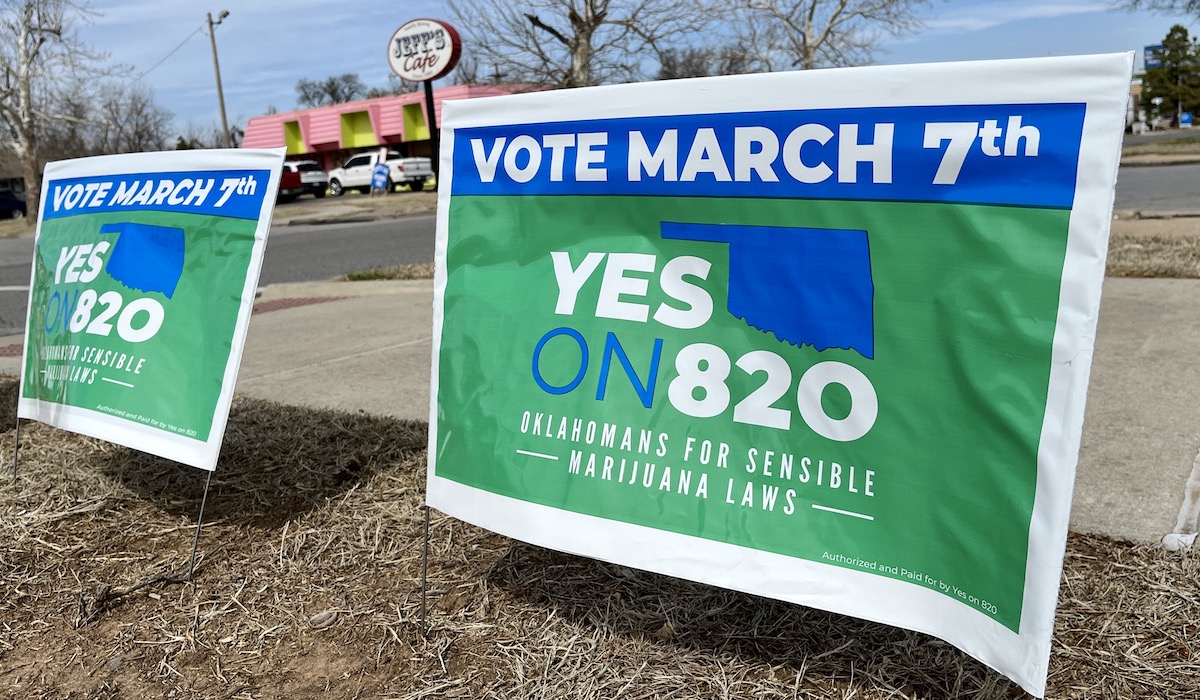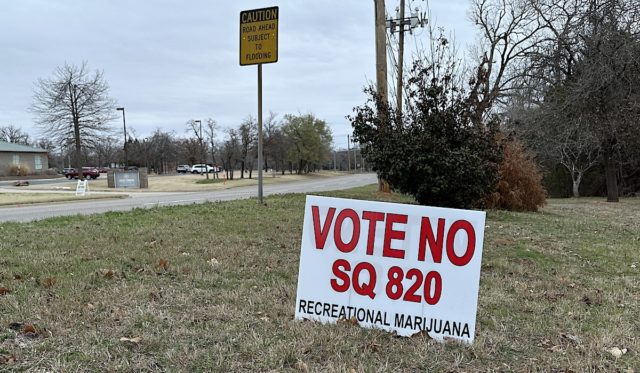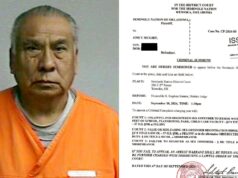
Oklahoma won’t be joining the ranks of states permitting the recreational use of marijuana for adults after voters in rural counties soundly rejected State Question 820.
Tuesday night’s overwhelming results stood as a triumph for those who believe the industry has grown too fast and caused too much disruption in parts of the state, and it landed as a stinging defeat for those in the burgeoning marijuana industry who had worked to bring the question to voters.
With 84 percent of precincts reporting, SQ 820 was losing 62.80 percent to 37.2 percent, winning a majority of the vote in only Oklahoma, Cleveland, and Tulsa counties. Highlighting the state’s urban-rural divide, SQ 820 was losing by margins from 30 precent to 70 percent almost everywhere else across the state. By the time all ballots had been counted, 61.68 percent of voters had opposed the measure, and all 77 counties ultimately voted against it.
Had it passed, SQ 820 would have legalized marijuana use for adults 21 and older, and it would have created an expungement process for some past marijuana convictions. It would have established a 15 percent tax to purchases.
Currently, 21 states allow recreational marijuana use, including neighboring Missouri, which legalized it in 2022.
‘No’ campaign focused on rural areas, parental concerns
The campaign opposing SQ 820 emphasized concerns about child access and foreign ownership of land in the state, as well as the proliferation of grow operations in rural counties that some critics believe has strained water and power resources in those areas. Some operations have been connected to organized crime syndicates, according to state law enforcement agencies.
While many of those grow operations are licensed by the Oklahoma Medical Marijuana Authority, some grow weed for the black market. In November, four Chinese nationals were found dead at a black-market grow operation in Kingfisher County, making headlines in the state and elsewhere.
Some Oklahoma legislators have also expressed concern about the black market and legal grow operations around the state.
“It’s the No. 1 issue that we face in rural counties,” Rep. Scott Fetgatter (R-Okmulgee) told NonDoc in 2021. “Every senator or representative I know that lives in a rural district is facing this issue of trying to figure out how to fix it.”
The “No on SQ 820” campaign also focused on the potential dangers to kids. Late in the campaign, a coalition of law enforcement and school officials opposed the passage of SQ 820. Former Gov. Frank Keating also joined the no effort, speaking out in a press conference Monday.
“The last thing I want to see is a stoned society. It makes no sense to me to open the floodgates and permit a substance as destructive to health, wealth and welfare as legalization of recreational marijuana,” Keating said. “It’s something that we as a society need to say, ‘enough is enough.’ We’ve had medical marijuana, and we don’t need people face-down in the streets.”
Oklahoma City Public Schools Superintendent Sean McDaniel was among a group of public education officials who also opposed SQ 820’s passage.
“During my more than 30 years working to improve the lives of young people, it is still heartbreaking to see a child damage, or even destroy, a promising future by starting down the road of substance abuse which often begins with marijuana. The record is clear, legalizing recreational marijuana for adults will lead to more children having access and trying it out,” McDaniel said in a statement.
Tax benefits and criminal justice not enough

Meanwhile, the Yes on 820 campaign attempted to build on the state’s broad medical marijuana program. With nearly 400,000 patient licenses issued in Oklahoma since voters passed SQ 788 in 2018, the state has become one of the most active medical cannabis markets in the country.
SQ 820 supporters made tax revenue and criminal justice reform the centerpiece of their campaign. The latter included the expungement of some past marijuana-related convictions and the elimination of incarceration for possession of small amounts of marijuana.
“I think the number one thing that resonates with people has been the compassion for other humans,” SQ 820 organizer Michelle Tilley said in an interview with NonDoc last month. “They don’t believe individuals should be put in jail for cannabis use because it’s an outdated practice that needs to end. We’ve all heard stories about people who get in trouble for marijuana, which is their introduction to the criminal justice system which can cost people their livelihood. I’ve spoken to people who don’t even use marijuana anymore who are going to vote ‘Yes’ solely for the criminal justice part.”
At the Yes on SQ 820 campaign watch party at the Tower Theatre in Oklahoma City, campaign attorney Ryan Kiesel said voters were “sold a bill of goods” regarding criticisms of SQ 820, but that opponents “do have some legitimate concerns.”
“We do have to have conversations with those Oklahomans,” Kiesel said.
He said the real focus of SQ 820 involved criminal justice reform, stating that in 2021 about 4,500 people were arrested and jailed “for small amounts of marijuana.”
“This was about keeping Oklahomans out of the criminal justice system, plain and simple. Since SQ 788 passed, there’s been this myth going around Oklahoma that we have somehow ended prohibition,” Kiesel said. “We know that is not the case, and now, a lot of Oklahomas do, too.”
Reactions to SQ 820 defeat
Around 8:30 p.m., after the Associated Press had declared defeat for SQ 820, political figures began releasing statements about the electoral results.
“Oklahomans rejected State Question 820. I believe this is the best thing to keep our kids safe and for our state as a whole,” Gov. Kevin Stitt said. “Oklahoma is a law and order state. I remain committed to protecting Oklahomans and my administration will continue to hold bad actors.”
Attorney General Gentner Drummond offered a similar reaction.
“I’m proud of Oklahomans for rejecting the expansion of organized crime by defeating State Question 820. Regardless of where one stands on the question of marijuana legalization, the stark reality is that organized crime from China and Mexico has infiltrated Oklahoma’s medical marijuana industry,” Drummond said. “I will continue to focus on this serious threat to public safety by targeting the illegal grow operations throughout our state.”
Although the Oklahoma Legislature’s 2023 regular session began Feb. 6, lawmakers have largely waited to consider marijuana-related measures until after the SQ 820 vote. Those discussions are expected to accelerate following Tuesday’s election.
Pollster Pat McFerron, who led the campaign against SQ 820, issued a statement around 9 p.m.
“We are obviously pleased with the results. We think this sends a clear message that Oklahomans oppose the unfettered access to marijuana we have experienced under our so-called medical program,” he said. “Voters clearly want to protect our childre, crack down on organized crime, and improve the mental health of those in our state.”
(Update: This article was updated at 8:45 p.m. Tuesday, March 7, to include comment from Ryan Kiesel. It was updated at 9:20 p.m. to include comment from McFerron.)





















